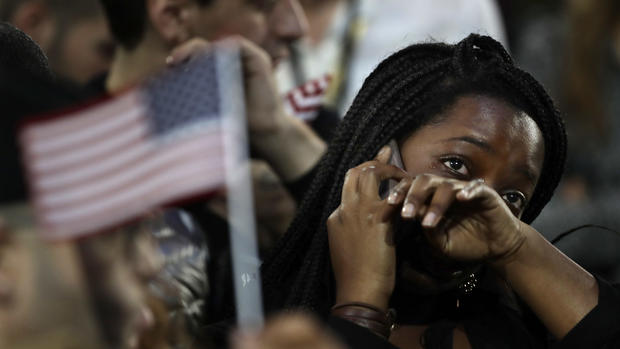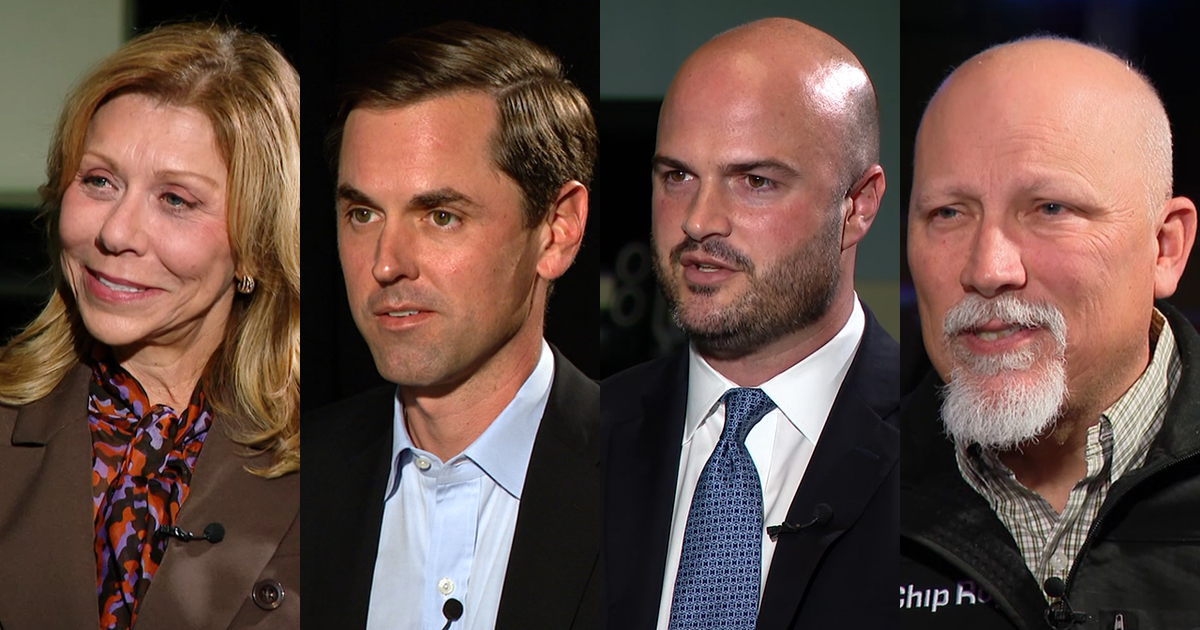How to deal with post-election emotional roller coaster
The weeks and months running up to Election Day saw it all: vitriolic arguments, social media tirades, fearmongering, campaign offices set afire, tears shed and even laughter as YouTubers, comedians and cartoonists, among others, took to satirizing the presidential candidates.
Now the votes are in, and after the months-long emotional roller coaster of the campaign, millions of Americans are dealing with complicated feelings, especially if their candidate lost.
Many people are going to be disappointed, said Ken Yeager, an associate professor in the psychiatry department at The Ohio State University Wexner Medical Center.
Yeager, who is also director of The Ohio State University Stress, Trauma and Resilience Program, told CBS News, “On either side, whether you win or lose, the idea is to be a gracious winner or loser.”
Focusing on that approach will go a long way to keeping the peace in deeply divided families, workplaces and communities, he said.
But it may be easier said than done.
Marcia Abercrombie, 52, said she felt anxious by the time Election Day rolled around and is glad it’s over, but she worries how people whose candidate lost will act — and act out.
“Everything has been so volatile. I don’t think I’ve ever seen it this volatile in all the years I’ve been voting. Everybody has such strong opinions,” said Abercrombie, who works for a tech company in North Carolina and is also a writer. In October, her state saw a Republican Party headquarters in Orange County firebombed and just this week, gunshots were fired at a Trump sign outside a home in the town of Cary.
Yeager said fear and anxiety are normal feelings after such an unsettling campaign season — even for people whose candidate won. If their choice was a so-called “lesser of two evils” vote, they may still have reservations about what the future holds despite the win.
Sharon McNamara, 61, a paralegal from Austin, Texas, told CBS News, “I feel very drained. The tone right now is that people are very drained. People are very worn out. I have friends who have really strained their friendships because of this election.”
She wonders if those relationships will repair themselves now that the ballots are counted, or if the damage is irreparable.
“Emotional forecasting” and how to handle it
Research suggests the election results may not impact a person the way they anticipate, though, said James Maddux, professor emeritus in the department of psychology at George Mason University.
“There’s a concept in psychology known as emotional forecasting which is concerned with our ability to predict what we’re going to feel if certain things happen to us. It’s largely based on the research of Daniel Gilbert at Harvard. It finds for the most part, that generally speaking, we are very bad at predicting our own emotions, how good we’re going to feel about something or how bad,” Maddux told CBS News.
Typically, we over-predict both, he said.
“When the good thing happens, we don’t feel as great as we thought we would. And if we feel bad, we get over it rather quickly.”
The concept has held true when it comes to how voters feel after elections, according to research, he added.
“People are very adaptive and very resilient,” said Dr. Michael Thase, a professor of psychiatry and the director of the Mood and Anxiety Program at the Perelman School of Medicine at the University of Pennsylvania.
Humans have the capacity to make strong connections and experience powerful feelings, and that can be especially apparent when it comes to politics and sports, he explained.
“Part of the glory of being human is to be able to care deeply and connect your sense of who you are into what you believe in and what you want to happen and in this case who you are voting for. Because we can care deeply, when those bonds break, when you lose, it’s not unusual to feel sad, down, blue or sometimes angry,” said Thase.
But it’s important not to succumb to feelings that are catastrophic, he said.
“When you’ve been campaigning for someone and are convinced they are the right person, maybe you’ve gotten into demonizing the opponent. The odds are, though, they’re not really a demon. We’ve had very few demons elected,” said Thase.
If the election didn’t go your way — and even if it did — there are many constructive ways to express yourself, say the experts:
- Gather with like-minded friends to talk through your disappointment. “Part of human nature is the affiliation with tribes and groups and kin,” said Thase.
- If you find yourself with someone who disagrees with the election outcome — at work or a family gathering, for example — consider being a sounding board. “Engaging in these difficult conversations requires a bit of tact and sensitivity,” said Yeager. But if it’s too much, tell them you are uncomfortable and would like to change the topic of conversation. Walk away if you need to, he advised.
- Steer clear of social media if you’re feeling volatile. “I’d tell people to avoid social media for a while and whatever support they seek should be in person,” said Maddux.
- Blog about your thoughts and feelings, but do it with grace, Maddux suggested.
- Distract yourself by doing something you enjoy — watching sports or a movie, for example.
- Exercise to help blow off some steam.
- If someone says, “Congratulations, your candidate won,” say, “Thank you, I’m sorry yours lost.”
- Don’t gloat if your candidate won. “No one likes the person who gloats, and particularly in the workplace setting, it’s difficult to work with people where there are simmering grudges,” said Maddux.
- Apologize to anyone you’ve hurt. “I’d suggest people stop and ask themselves, ‘Who have I argued with about this election and whose feelings might I have hurt or what relationships might I have damaged over last few months. Then seek those people out by phone or email and apologize. Nothing will make you feel better than a genuine apology,” said Maddux. Even if the other person doesn’t receive it well, your good intentions will help ease your stress, he said.
- Learn from your mistakes. “Life goes on and there are things to learn about it. Make use of this info and use it next time around,” said Thase.
If life goes on and you still can’t move past the loss, even after venting about it, reach out for help, or nothing will change, Thase said.
Yeager said there are constructive ways to address very real fears about the impact of potential health care changes, immigration policies and economic anxieties that can come with a new administration.
He said that no matter what the candidates promised, it’s not all going to happen overnight.
“The political system is very complex and moves very slowly in the United States,” he pointed out, and that gives individuals and families time to plan and become politically active.
“If you’re one of those families affected, ask yourself, how can you become active at a grassroots level and how can you make a difference? How can you stand together in your community and make your concerns heard?”





